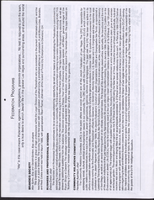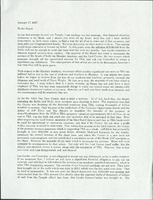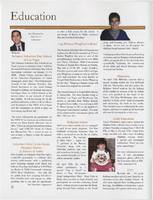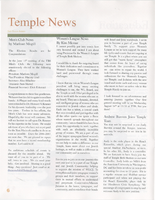Search the Special Collections and Archives Portal
Search Results

Transcript of interview with Dedee (DaVeen) Nave by Claytee D. White, June 8, 2015
Date
Archival Collection
Description
Dedee (DaVeen) Nave reveals a life filled with distinguished results in the cultural evolution of Las Vegas since her move to the valley in 1971. She was a young bride and soon a mother when she arrived with her can-do energies. She was a trained educator who was eagerly looked outside the classroom for a way to make a difference in the community when she took a position with the Camp Fire Girls Over the following decades, the impact of involving Dedee in many valued projects is evident. In this interview, she provides a glimpse into her various aptitudes and the many people she has worked with to great results. Dedee Nave was born DaVeen Maurer in 1948 in Indianapolis, Indiana, to David and Virginia Maurer and has a sister, Marilyn Maurer MacCollum. Their mother was a convert to Judaism who instilled them with a solid Judeo-Christian foundation. When Dedee became the bride of a mixed marriage, she raised her daughter Alisa in the Jewish faith. Alisa, who is married to Robb Worth, is a practicing attorney in Las Vegas. A graduate of Stephens College in Columbia, Missouri, Dedee studied fine arts, considered being a theater major, modified her plans and became a skilled organizer of people and projects. This ability to envision, implement, and fundraise is seen in Dedee?s distinguished list of community programs, among them her work with: the City of Las Vegas Arts Commission; two terms on the Nevada State Arts Council; a past president of the Junior League of Las Vegas; former chairperson of the Junior League?s Endowment Fund Trustees; Lied Discovery Children?s Museum opening; and chairperson of Morelli House Public Program and many other initiatives.
Text
Marla Letizia oral history interview
Identifier
Abstract
Oral history interview with Marla Letizia conducted by Barbara Tabach on August 26, 2015 for the Southern Nevada Jewish Heritage Project. Letizia discusses living in Las Vegas, Nevada since the age of two. She talks about her activity in the Jewish community, owning the Letizia Agency with her husband, and the mobile billboards business.
Archival Collection

Transcript of interview with Michael Saltman by Barbara Tabach, December 16, 2014
Date
Archival Collection
Description
In this interview, Michael Saltman recounts his family background, his schooling in Michigan, and living abroad in London and Munich. His travels to Israel in 1968 reinforced his connection to Judaism. Saltman and his wife, Sonja, moved to Las Vegas in 1975 and he began working with Larry Larkin, who eventually became his partner. He discusses several projects he completed with Larkin, including shopping centers and apartment complexes. He talks about the changes in Las Vegas that came about from the availability of financing from legitimate sources, and the population growth of the area. He then talks about his involvement in the local Jewish community with the Jewish Federation, Anti-Defamation League and Congregation Ner Tamid.
In 1942, Michael Saltman, the son of a rugged Canadian entrepreneur and of an educator, was born in Flint, Michigan. Michael spent a fulfilling childhood in Flint, where his family was involved in the Jewish community, even helping start a new temple. However, his life changed dramatically when his father passed away during his teenage years. At his mother's insistence, Michael went to law school after graduating from Michigan State University, and received his Juris doctor from Wayne State University. From Detroit, Michael headed to London to participate in an LL.M. program, though he quickly withdrew and landed a position with a life insurance and investment company in London. Michael soon relocated to the company's Geneva office, where his job included establishing operations in Israel. It was during these trips that he more intensely connected with Judaism and his Jewish identity. Michael left the company to join a former colleague at Shareholders Capital Corporation, where he met his wife Sonja. The couple moved to Munich, where they lived until 1975, until moving to Las Vegas. In Las Vegas, Michael became a successful real estate developer. His projects include apartments, shopping centers and office parks, like Village Apartments, Campus Village Shopping Center and Renaissance Center. He later opened Food 4 Less grocery stores in Nevada, Utah and California, eventually buying the Kansas-based company from Lou Falley. He and his partner later sold the company to Kroger. Michael served on the local Jewish Federation's board of directors, and Sonja is a longtime board member for the Anti-Defamation League's regional office in Las Vegas. In 2003, Michael and Sonja co-founded the Saltman Center for Conflict Resolution within William S. Boyd School of Law. Michael's other efforts to promote peaceful conflict resolution include the production of Streetball Hafla, a movie shot in Israel about Jewish and Palestinian teenagers interacting in basketball camp.
Text
Midbar Kodesh Temple (Henderson, Nev.)
Midbar Kodesh is a Conservative Jewish temple founded in Henderson, Nevada in 1995 by former members of Temple Beth Sholom. Population growth and physical expansion of real estate warranted the establishment of the second Conservative congregation in Southern Nevada, whose name means “Holy Desert.” Temple Beth Sholom was moving to the west side of the valley, and a group of families- the Kaminskys, Goldmans, Rothmans, Simons, Goldsteins, and Feldmans, decided to start a new temple on the east side.
Corporate Body

Second Baptist Church (Las Vegas, Nev.)
"The congregation of Second Baptist Church began on February 22, 1942..."
http://secondbaptistlv.org/about/
Corporate Body
Collection on the Las Vegas, Nevada Jewish Community
Identifier
Abstract
The Collection on the Las Vegas, Nevada Jewish Community spans from 1964 to 2006 and is comprised of scrapbooks, genealogies, ephemera, and other material produced by or for the community. The Hadassah scrapbooks date from 1964 through 1971 and contain invitations, photographs, and records of events and fundraising efforts. Material related to various congregations includes bulletins, fliers, correspondence (form letters), photographs, newspaper clippings, and recorded media. The Jewish Genealogy Society records include bulletins, newsletters, and meeting agendas. Also included is a family genealogy.
Archival Collection



